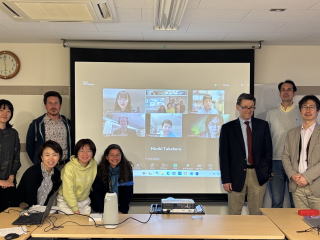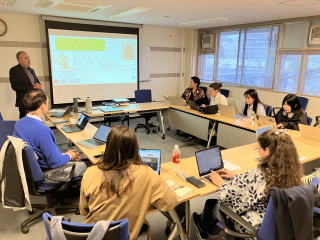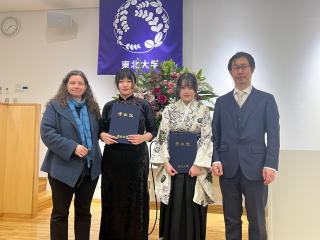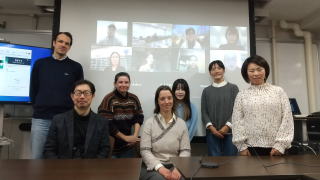- 2025年度
- 博論審査 2025年8月7日 ランポーニキアラさんが博論「因果関係をめぐる政治性と市民の関与―福島原発事故後の小児甲状腺がんをめぐる論争(英語)」を提出し、最終審査で合格しました。


- 博論審査 2025年8月1日 フォンタネーラパオラさんが博論「地域レジリエンスにおける文化遺産と地域知の役割の探究――
只見ユネスコエコパークにおける参加型アプローチ(英語)」を提出し、最終審査で合格しました。


- 特別講義 2025年4月22日 Prof. Arbakhan Magomedov(東北大学客員教授、Russian State University for Humanities教授)
- The title: The Russian-Ukrainian War and the Arctic Indigenous: An International and Russian Levels.
250422 lec.pdf へのリンク

- 特別講義 2025年4月8日 Emmanuel Garnier(東北大学客員教授、Research Professor at the Atomic Energy
Commission (Paris-Saclay University) and a Professor at the Institut of France)
- Title: Siberian indigenous peoples facing environmental changes: 17th-20th centuries
250408 Lec.pdf へのリンク

- 2024年度
- 2023年度
- 2024年3月26日 劉さんと銭さんが修士号を取得し、修了しました。


2023年12月19日 マルキナ先生の特別講義が行われました。
- 2023年9月25日 朴さんが博士号を取得、鄭さん、肖さんが修士号を取得し、修了しました。
- 2023年8月21日 修士論文・博士論文提出後に懇親会を行いました。
- 2022年9月30日 石井花織さんが博士号を取得しました。
- 2021年3月25日
2020年度は檜和田さん、王さん、佐藤さんの三人が修士論文を書きました。学位授与は研究室単位での授与となりました。

-
2025年4月8日 Emmanuel Garnier(東北大学客員教授、Research Professor at the Atomic Energy Commission (Paris-Saclay University) and a Professor at the Institut of France)
Siberian indigenous peoples facing environmental changes: 17th-20th centuries
2023年7月25日 パホモフオレグ(東北アジア研)「ロシア知的伝統におけるシステム論:ロシア民族学の例として」
2023年5月23日 ユリア・ゲルステル(災害研)「Local culture and community-building in post-disaster Japan」
2023年3月14日 Sora Duly(PhD candidate - Aix-Marseille University, JSPS fellow in Tohoku University) "Mass fatalities and their forensic management: the interactions of medicolegal work with the local cultural and religious funerary norms."
2023年3月4日(土) 15:00 – 17:30
東ユーラシア研究・東北大学拠点研究会 第3回国際セミナー ロシア先住民社会の今日的葛藤
3st Seminar of East Eurasian Studies, Tohoku University Unit ”Contemporary Conflicts in Russian indigenous societies”
1 Dr. Victoria Peemot (University of Helsinki)
Militarization in the Ethnic Periphery of Russia: Memory Politics and A False Sense of Kinship
2 Dr. Zoia Tarasoova (Independent Researcher)
Religious resurgence among Sakha (Yakuts) in the context of Muslim immigration from Central Asia
16:50 – 17:30 Free discussion
主催 人間文化研究機構グローバル地域研究事業東ユーラシア研究プロジェクト東北大学拠点、東北大学東北アジア研究センターマイノリティの権利とメディアユニット
2021年7月20日 16:20ー17:50 オンライン特別講義
山口睦先生(山口大学准教授) 「贈与論の現代的展開」
2020年1月28日
小谷竜介先生(東北歴史博物館学芸員)「モダンデザインが結ぶ暮らしの夢」
2019年11月12日 16:30〜18:00 於: 川北合同研究棟1F CAHEラウンジ
Donatas Brandišauskas (ブランディザウスカス)先生 (ウィリニウス大学(リトアニア)教授、東北大学東北アジア研究センター客員研究支援者) "Emplaced Evenki relationships with wolves in the changing environmen tof East Siberia: relatives or enemies"2019年10月2日 16:30〜18:00 於:川北合同研究棟1F CAHEラウンジ
遠藤スサンネ先生(東北大学高度教養教育学生支援機構講師)「日本・ロシア・アイヌの初期接触―千島列島に焦点をあてて」
-
2019年4月16日 16:30〜18:00 於:東北アジア研究センター第二会議室
講師:Arbakhan MAGOMEDOV(マゴメドフ)先生(ウリヤノフスク国立大学(ロシア)教授・関西大学客員教授)”The Rising Voice and Changing Leadership of Indigenous People in the context of Accelerated Industrial Development ofRussian Far North
2018年11月13日 15:00〜16:00 於:東北アジア研究センター第二会議室
Luidmila MISSONOVA(ミソノワ)先生(ロシア科学アガデミー民族学人類学研究所研究員)"Tungus-Manchu Folk Art Artifact : adaptation codes in historical memory”
2018年5月15・29日 15:30〜18:30 於:東北アジア研究センター第二セミナー室
齋藤秀一先生(写真家)「映像人類学のための映像講座(ビデオ講座)」2017年7月25日 16:00〜18:00 於:東北アジア研究センター第二会議室
是恒さくら 先生(美術家)「アーティストにとってのフィールド調査 ―民俗学・文化人類学・芸術の交わるところ―」
2017年5月8・16日 15:00〜18:00 於:東北アジア研究センター第二セミナー室
齋藤秀一先生(写真家) 「写真講座」
-
2023/3/14 1st Work in Progress Seminar
Speaker: Sora Duly(PhD candidate - Aix-Marseille University, JSPS fellow in Tohoku University)
Title: "Mass fatalities and their forensic management: the interactions of medicolegal work with the local cultural and religious funerary norms."
Abstract: Large-scale disasters such as the 2004 Indian Ocean Tsunami and the 2011 Tohoku Earthquake and Tsunami have produced large quantities of fatalities whose bodies had to be searched for, recovered, identified, and returned to their families. The care and management of these bodies have many implications, including the legal and administrative requirements of accounting for the missing and the dead and the social need to mourn for the dead individually and collectively. For the first aspect, forensics plays a central role in applying scientific methods and techniques to recover and identify the dead, enabling, for example, the issuance of a death certificate required by the victim's family to claim succession and insurance money. And for the latter, religion has played a traditional role in organising and prescribing the funerary practices and norms used to mourn. Moreover, religion can largely influence how a disaster is experienced and made sense of (fatality, punishment). The present research project focuses on the issues that arise from the interaction between religious and cultural funeral practices and the scientific and legal forensic management of the dead. To what extent do the internationally elaborated forensic protocols for handling and caring for the dead effectively adjust to, negotiate with, or oppose local funerary norms and prescriptions?